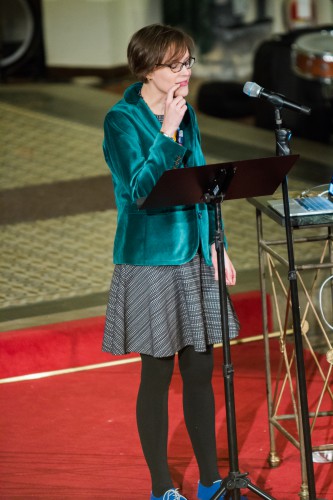
A little self-referential praise never hurt, right? Grateful for this one from Sarah Denley Herrington.
Last week my husband and I were fortunate enough to attend Mockingbird’s ninth annual conference at St. George’s Church in New York City. We grew up in the South, were at one time New Yorkers (I use that title very liberally), and are now living back in Mississippi with our two young children.
The conference title, Relief: The Boldness of Grace in a World of Expectation, as usual, could not have been more apropos to my life and circumstances. I’m seven months pregnant with our third and it’s the kind of pregnancy where people ask you if there’s “just one in there” and feel comfortable using descriptors like “ripe”. So really, any word of relief is a good word. But more and more I’m discovering how much expectations impact me and the concentric circles I find myself a part of.
The first talk of the conference was given by my friend Sarah Condon and I felt a certain affinity (that I basically always feel when I hear Sarah speak) when she mentioned her proclivity for listening to National Public Radio–even during the pledge drive. She explained that basically listening to the problems of the world helps her feel not as complicit in the problems of the world. I’m sure on some deep level that’s true for me too, but the main reason I consider it such a “lifegiving thing” (gosh, now that I’m at a church mostly comprised of Southern people over the age of sixty five I really miss the vernacular of our hipster Christian friends further north) is because it makes me feel like an actual, grown person. I spend my days at home caring for our house and children, and also (hopefully) schooling our children on issues on a level a bit higher than The Magic Treehouse.
As I was listening to All Things Considered in between a prenatal appointment and a visit to a restaurant–by myself–I heard a piece that fascinated because it intersected so strongly with many of the ideas presented at the conference.
It was a relatively short segment about a new report from the CDC on life expectancy. The raw data basically says that life expectancy for white women has declined by about a month and life expectancy for black men has increased by about six months. Of course, the real point of interest is why? The ensuing analysis was thought-provoking to say the least. Two researchers were on the show to discuss the findings: One said that the lower life expectancy of white women is due to what she calls “deaths of despair”; the other explained that these deaths include suicide, accidental drug overdose, and liver damage caused by long term overuse of alcohol. Digging even further, the researchers discussed how “It’s possible that working-class whites lost the narrative of their lives” (cue David Zahl, wrapping up the conference last weekend by reminding us that “God tells our story by deconstructing the story we have about ourselves. What is left is the story of Calvary. And that is the only story that matters.”). Things intersect even more vividly when the host of the show interjects “expectations may be the key difference between white women, whose life expectancy fell in the CDC study, and black men, whose rose by almost half-a-year.” Finally, a sociologist who studies race and income at Harvard concludes the discussion by explaining that white people are experiencing many negative economic situations they were not raised to see themselves in and it’s taking its toll not only emotionally, but physically. It was so interesting to me to hear about literal life expectancy tied to expectations.
One of my favorite talks from the conference was a breakout led by Jacob Smith and Sasha Heinz called Good Enough? Where Positive Psychology and the Gospel Meet. It was a fascinating look at some of the things that interest me most. One of the most powerful takeaways was that the grammar of God is declarative (“you are enough”). People always want to know where the rubber meets the road and how a theology should outwardly manifest itself. That’s not really a bad thing, and it was a highly practical session. Jake and Sasha both spoke to this question and then several people in the audience shared some anecdotes. John Zahl shared briefly about how his view of imputation has allowed and encouraged him to begin addressing his parishioners specifically as saints when speaking or writing to them personally.
This idea of how my theology impacts my daily living used to be a source of great concern, and to be honest, distress in my own life. Did I need to adopt an orphan from China? Serve at the soup kitchen twice a week and lead a youth Bible study? Or would buying the meal of the person behind me in the drive thru line be enough? Good Lord! What are you asking of me? And will I ever be enough?
These days, I do still ask that question, but I’ve come to see it as a much more organic thing. Even as I’ve gradually adopted, in Mbird parlance, a much lower anthropology, I’ve also started to see people as more loved and valuable which in some supernatural way makes it easier to love them.
When I think about a theology outwardly manifesting itself in a beautiful but entirely non-rule-driven, expectation-driven way I largely think about our time attending Calvary-St. George’s when we lived in New York. I recently reminisced about spending time keeping watch and praying Psalms during Holy Week the year we lived there. One thing that made the night very significant for me was that not only were my exhausted small children welcomed in the praying of the Psalms, so was my unbelieving husband, who had very recently confessed his very deep (and growing) uncertainty and skepticism to me, six years into our marriage. He’s ironically the one who wanted to do it and when he signed us up, the wonderful priest and our dear friend Jacob didn’t give him the side eye or question his motives.
You see, that’s the beauty of a church that truly teaches the Theology of the Cross. There are very, very few qualifications. My husband was welcomed in the pews, welcomed at the altar, and welcomed that night. Why? Because none of that is about him. I will never forget the way we were met right where we were. This theology effects everything–how you deal with broken people, small people, uncertain people. I saw this manifested in such tangible, but unforced, ways.
In a much vaster scope than my little nuclear family, I wonder if the life expectancy of black men will continue to rise as they are told more often that “Black Lives Matter.” Being told you matter certainly feels like a declarative word, similar to how Jacob shared about a college professor who went above and beyond to affirm his value as a student. It certainly is something to hear a word of authority outside yourself proclaim that you are worthy.
I’ve thought about the community that loved and welcomed us at Calvary-St. George’s literally every day since we’ve moved back to Mississippi and I carry the peace I learned there when dealing with my sometimes overwhelming anxiety, my children’s sometimes atrocious behavior, and the fear that sometimes plagues me when thinking of my husband’s skepticism every day as well. There are very few things I am more grateful for in my life than this church, and the conference and website that brought me to it. But one of them is the Cross it consistently pointed me to.
I am so, so thankful that I got chance last week to once again hug our dear friends, sit in those pews, and feel the relief of a declarative word said boldly over my exhausted, anxious self.

COMMENTS
4 responses to “Life Expectancy (In a World of Expectations): A New York Conference Review”
Leave a Reply















Glad to hear that about John Zahl calling his parishioners “saints.”
Because that’s what “we believers” are.
I was at that breakout, and that was my favorite moment of the conference also…………First Corinthians chapter one has a lot of nerve – calling us Bozo’s saints – and those are words of eternal life and pronouncements of affirmation………where else would we go????
I think I’d dig hangin’ at JZ’s church
I love this!! When the word ‘saint’ is used in the Epistles, it is referring to ‘living’ people. Not dead.
Can’t wait to listen to the podcasts from this year’s conference. Some day, I’d like to attend one in person.